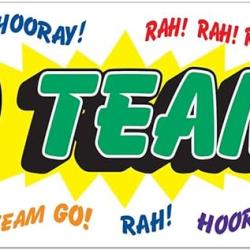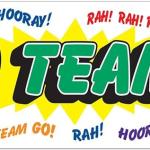In a recent guest-post at Jon Acuff’s Stuff Christians Like blog, Paul Angone wrote about the evangelical subculture’s enthusiasm for “Claiming Musicians as One of Us.”
If you’ve ever been a part of this subculture, then you know exactly what Angone is talking about. If not, just think of the fervent evangelical fandom that’s sprung up around Tim Tebow and imagine he were a musician instead of a football player. (Think of it this way, Tim Tebow : football :: Scott Stapp : music.)
Angone ably describes this claiming-as-one-of-us phenomenon, then asks:
But why? Why is it so tempting for us to throw the Christian label on musicians who have purposely tried to avoid it?
He offers three reasons, but I don’t think any of them is really the cause of what he describes. They’re all, rather, just related symptoms of the same disease.
That disease, once again, is what I’ve been calling evangelical “tribalism.” This is what’s at the root of many of the worst aspects of American evangelicalism. It’s the idea that evangelical Christians constitute “Our Team,” and that Our Team is in a constant competition with Their Team. This tribal framework shapes how evangelicals approach nearly every subject or area of life — functioning like the old binary view during the Cold War in which any event was perceived somehow as a “victory” for either the U.S. or for the Soviets and thus as a “defeat” for the other team.
This tribalism is why Evangelical Christians like Claiming Musicians as One of Us. Just look at that phrase: “One of Us.” As opposed to “One of Them.” Every musician claimed as “one of us” is a victory for Our Team and a defeat for Their Team. This never-ending competition between the teams or tribes is a zero-sum game. Every musician claimed as “one of us” is a win for “us” and a defeat for “them.”
This zero-sum view, I think, accounts for part of the backlash against Tebow. No one would mind evangelicals celebrating the accomplishments of an evangelical athlete any more than they would begrudge, say, Japanese fans’ celebration of Ichiro’s amazing career. But because of evangelicals’ zero-sum tribalism, their cheers for Our Team are usually inseparable from trash-talking directed at Their Team. It gives every “Hurray for Our Team!” an implicit, unspoken (usually) echo of “Suck it, Their Team!”
The tribal dynamic also explains the odd flip-side of what Angone describes. To paraphrase a line from The Blues Brothers, American evangelicals listen to “both kinds of music” — both “Christian” and “secular.” Those are the tribal categories evangelicals apply to every musician. The distinction usually depends not on the quality of the artist, the style of music played, or even the lyrical content. It depends on the record label. A musician on the Myrrh or Word or Sparrow labels is, by definition, a “Christian” musician. A musician who isn’t on such a “Christian” label is, by definition, a “secular” musician. (Thus, for example, John Rutter’s Requiem would be a “secular” work of music.) It’s the same idea as a “Christian novel” being one that is from a “Christian” publisher and sold in a “Christian book store.” Thus Left Behind is a Christian novel, but The Brothers Karamazov is “secular.”
But as much as evangelicals like “Claiming [Secular] Musicians as One of Us” — eagerly anointing Mumford and Sons or Justin Bieber as part of “Our Team” — they also despise as “sell-outs” any established Christian-label artist who crosses over to “secular” success. When Miley Cyrus had the No. 2 song on the charts with “Party in the USA,” evangelicals were eager to claim her as “one of us.” When Amy Grant had the No. 1 song on the charts with “Baby Baby,” evangelicals vilified her for supposedly no longer being “one of us.” This is because Cyrus is somebody that they thought was on Their Team, but who really turns out — once “claimed as one of us” — to be part of Our Team. Yay, Our Team! Grant was somebody that we thought was on Our Team, but who we came to fear was really part of Their Team. Boo, Their Team!
And it’s not just musicians and athletes — evangelicals can do this with everything. Everyone can either be claimed as “ours” or condemned as “theirs.” Every event can either be claimed as a victory for Our Team or mourned as a defeat.
This causes problems.
















